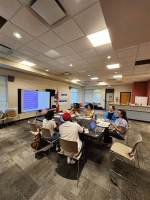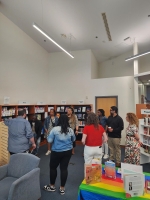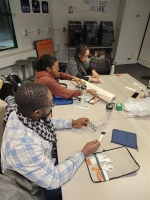Anti-Black Racism Working Group
Pickering Public Library
Innovation Synopsis
The Anti-Black Racism Working Group is an innovative model redefining how equity and inclusion take root in public institutions. Reaching its 5-year milestone, the longevity, measurable impacts, and enduring volunteers, prove the group is an effective framework for building trust, promoting accountability, and ensuring Black residents shape the policies and programs that affect them.
With intention, this model ensures the work of affecting change falls on staff and not those who have experienced harm. Simultaneously, this model ensures solutions are deeply informed by lived experiences and transforms how community participates in service design.
Challenge/Opportunity
- Power Imbalance in Decision-Making
Traditional equity efforts are often designed for Black communities, not with them. - Lack of Representation
Underrepresentation of Black staff in public institutions results in an underrepresentation of Black voices, perspectives, and lived experiences in the evaluation and decision-making processes that shape services. - Systemic Barriers and Bias
Anti-Black racism is embedded in longstanding policies, practices, and system interactions that produce inequitable and harmful experiences. - Short-Term Equity Efforts
Many diversity initiatives are performative or one-time projects without lasting impacts rooted into structural changes within internal processes and staff accountability practices. - Distrust Between Institutions and Community
Communities who have historically experienced systemic harm do not always have direct access to decision-makers, internal policies, or safe restorative conversations centered around their lived experiences.
Key Elements of Innovation
Since Oct 2020, the Working Group, made up of local Black residents, has used a community-driven approach to tackle anti-Black racism in the library. Priorities are shaped by surveys, client feedback, and lived experience. Meeting monthly, members work with staff to co-create actionable recommendations, which become departmental Work Plans with accountability built in through performance reviews. 7 Work Plans with over 40 recommendations combined are currently being implemented. By embedding Black voices in decision-making and policy, this initiative turns equity from intent into lasting, measurable change.
This model strengthens relationships with real residents who gain a deeper understanding of library services. It offers a space to repair broken trust and empowers Black residents to profoundly connect or reconnect with the library.
This model is one of a kind yet offers a replicable, innovative model for addressing systemic barriers and advancing lasting inclusion in libraries.
Achieved Outcomes
- 900+ hours of collaboration since Oct 2020
- 7 work plans co-created, with Working Group members shaping changes that will impact client experiences for the long term
- 5 work plans have several deliverables achieved. This includes changes to how staff are trained and assessed for their demonstrated DEI learning/actions, changes to hiring processes, changes to event and collections marketing, changes to collection development, increased Black-focused programming and partnerships and more.
- 200+ Library professionals reached by sharing their work at library conferences, so that other libraries can adapt this model for their own equity and inclusion community initiatives
- In 2025, conducted the 2nd Anti-Black Racism Community Survey in follow up to the original survey conducted in 2020. The survey assesses impacts of the Work Plans implemented to date. Results from 220 respondents demonstrate positive shifts in the Black client experience and will shape 2026 Work Plans.



